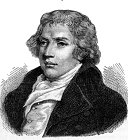Hide
hide
Hide
West Country Poets

WILLIAM GIFFORD (1756-1826)
William GIFFORD, best known as the editor of the Quarterly Review, was born at Ashburton, in Devon in April, 1756. He was the son of Edward GIFFORD, who, when a youth, twice ran away to sea, and afterwards consorted with Bamfylde Moore CAREW, the king of the gypsies. The family had in past generations possessed considerable estates at Halsworthy, near Ashburton. William Gifford was taught reading by a schoolmistress and learnt old ballads from his mother. In 1764, his father, who had been abroad returned with £100 prize-money, and set up in business as a glazier. The son was then sent to the Ashburton Free School, under Hugh SMERDON. Three years later the father died of drink, leaving his widow with an infant son. She tried to carry on the business, but was plundered by her assistants, and died in a year. The infant was sent to the workhouse, and William Gifford, when he was old enough to work, did his best to help his younger brother. William, who had been taken charge of by his godfather, was sent to school for a short time, then put to farm-work, for which he was not fitted, and at the age of thirteen placed in a small Brixham coaster. Here he stayed for a year, when he was once more sent to school at Ashburton, and began to make rapid progress. He helped the master in teaching other pupils, and aspired to the mastership, SMERDON being now infirm. His godfather, however, bound him apprentice to a shoemaker. In his employment he remained for some years, adopting all sorts of expedients to gain knowledge and a store of books. He also composed rhymes, chiefly of a satirical kind, and sometimes made sixpence in an evening by reciting them. His master, however, discovered him, and deprived him of his treasures, forbidding him to do any more literary work. For some time he was crushed, but at length a surgeon in the town, named COOKESLEY, heard of Gifford's verse-writing, saw him, gave him advice, and raised a subscription to buy off his term of apprenticeship. The subscribers sent him to school, and in 1779 the master thought him fit for the University, and accordingly, by the assistance of Thomas TAYLOR, of Denbury, COOKESLEY obtained for him a Bible clerkship at Exeter College Oxford. Once there, he studied hard, and matriculated October 10, 1782. He translated Juvenal, but was unable to publish the work, owing to the death of his friend. However, he commenced studying other languages, and the college authorities enabled him to take a few pupils. Shortly after this he attracted the notice of Lord Grosvenor, who offered to become responsible for Gifford's present support and future establishment, and until other prospects offered, Gifford became a member of the family of Grosvenor, and acted as travelling tutor to his son. His 'Juvenal' was then taken up again, and appeared in 1802, with an autobiography. Gifford first came into notice by the two satires, the 'Baviad' (1794) and the 'Maeviad' (1795), published together in 1797. In these works he assailed some of the literary circles of the day, as well as the small dramatists. Gifford became well known in the political world, and was editor of the Anti-Jacobin, or Weekly Examiner, 1797-98. When the Quarterly Review was started in 1809, Gifford was appointed editor, and was highly successful in this capacity, continuing to edit the periodical until 1824, when he was succeeded by John Taylor COLERIDGE, and in 1825 by LOCKHART. Gifford was a little man, almost deformed, and had long been full of ailments, which may partly explain his sourness of temper. In 1822 his health broke down, and he died at 6 St. James's Street, December 31, 1826. He was buried in Westminster Abbey in January, 1827. He appears to have been of penurious habits, and left the bulk of his savings, amounting to £25,000, to the Rev. Mr. COOKESLEY, son of his first patron, besides other legacies, including one to the poor of Ashburton. He is said to have been amiable in private life, kind to children, and fond of dogs.
Besides his literary engagements Gifford was one of the Comptrollers of the Lotteries, and Paymaster of the band of Gentlemen Pensioners.
TO PETER PINDAR (DR. WOLCOT)
Lo, here the reptile! who from some dark cell,
Where all his veins with native poison swell,
Crawls forth a slimy toad, and spits and spews
The crude abortions of his loathsome muse
On all that genius, all that worth holds dear -
Unsullied rank, and piety sincere;
While idiot Mirth the base defilement lauds,
And Malice, with averted face, applauds.
. . . . five more verses in the same vein . . .
Transcribed by Sandra Windeatt from: Wright, W.H.K., (1896) West-Country Poets: Their Lives and Works. London: Elliot Stock, pp.201-203.
Link: more information about William GIFFORD, from A History of the Book in Devon.
